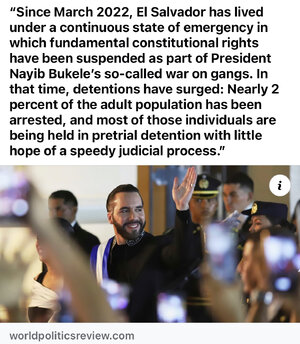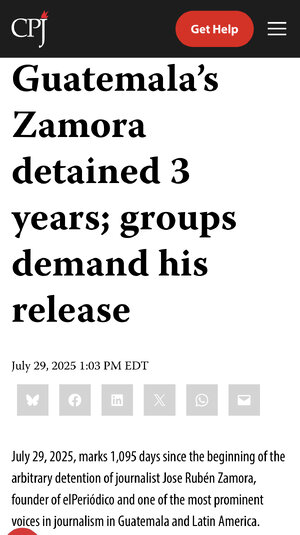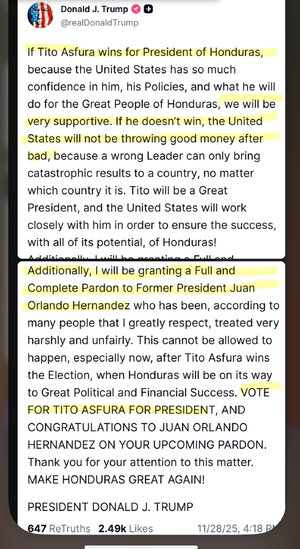...The Trump administration’s ideological cheerleading, and the riskiness of the bailout, have made it easy to ridicule, by both liberals and conservatives. Democratic Sen. Elizabeth Warren urged Trump to stop “giving away our money to his corrupt buddies.” Republican Sen. Chuck Grassley criticized any bailout of a country that supplies China with soybeans to make up for the food it no longer buys from U.S. farmers.
The irony is that Trump could have made a foreign policy case for supporting Argentina that might have won bipartisan support. After all, the United States has few friends in the region these days. The three largest countries — Brazil, Mexico, and Colombia — are led by leftists who are mistrustful of U.S. power. Virtually every leader in Latin America, regardless of party, favors nonalignment in the U.S.-Chinese rivalry.
That is not true in Argentina. Even before the last U.S. election, Milei had plainly stated his alignment with the United States, and his low opinion of China. In his presidential campaign, Milei criticized Argentina’s decision to join China’s Belt and Road Initiative, a source of infrastructure finance, insisting that he would not make deals with “communists and murderers.” Last year, he welcomed President Joe Biden’s secretary of state to the Casa Rosada, Argentina’s presidential palace. Democratic and Republican lawmakers have also met with Milei in Buenos Aires.
Admittedly, Argentina is a not a serious player on the international stage. Nor is it relevant to the White House’s biggest interests in the region, slowing migration and fighting cocaine and fentanyl traffickers. Still, it is an increasingly valuable partner. The country has huge reserves of lithium and copper, critical ingredients for batteries. It is also a consequential battleground for U.S.-Chinese competition. Under previous governments, Argentina allowed China’s military to open a space base in the country; flirted with the possibility of buying Chinese fighter jets and a Chinese nuclear power plant; and considered giving China special access to the strategic Straits of Magellan at the southern tip of the continent. To ride out its last debt crisis, Argentina tapped a Chinese line of credit.
The United States will rely on Argentina’s support even more in the coming months. The new U.S. defense strategy will reportedly prioritize the Western Hemisphere, a pivot that would be tough without at least one big country laying out the red carpet. There are few alternatives available. Trump alienated President Luiz Inácio Lula da Silva by imposing a 50 percent tax on imports from Brazil as punishment for the prosecution of Bolsonaro for plotting a failed coup d’état. In late September, the State Department revoked Colombian President Gustavo Petro’s visa after he criticized the United States during a visit to the United Nations. Trump is reportedly considering bombing drug cartels in Mexico over the objections of the Mexican government. He might also invade Venezuela to depose its strongman leader, Nicolás Maduro, whose unpopularity with his neighbors might not be enough to overcome the unpopularity of U.S. military interventions.
Finally, though Milei’s Make America Great Again credentials are unquestionable, his commitment to control spending, rationalize monetary policy, and pursue pro-market reforms is mostly in line with bipartisan U.S. regional priorities. Should those ideas achieve the broad appeal of Lionel Messi or the late Pope Francis, other Argentine exports, it would help stabilize Latin America and create opportunities for U.S. firms.
None of this necessarily argues for a financial rescue that could very well end with Argentina defaulting on U.S. taxpayers. The country is on its twenty-third International Monetary Fund bailout, a global record. After its last economic meltdown, in 2001, the U.S. government and U.S. bondholders were among the creditors it stiffed. That could happen again should Axel Kicillof, the influential Peronist governor of Buenos Aires province, end up succeeding Milei.
Nevertheless, greater cooperation with Argentina, including U.S. mining and energy investments and reduced trade barriers, would rightly reward Milei’s sensible economic strategy and foreign policy partnership, and demonstrate the dividends for regional leaders who wager on Washington in great-power competition."
Last month, Javier Milei, Argentina’s flashy libertarian leader, arrived in New York City not with his trademark chainsaw, but with his hat in his hand.
warontherocks.com
Benjamin Gedan, Ph.D., is a foreign policy fellow at the Latin America Studies Initiative at the Johns Hopkins School of Advanced International Studies. Previously, he was responsible for Argentina as a South America director on the National Security Council staff in the White House and at the State Department.








